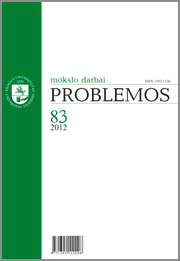KANTIŠKOJI PATYRIMO SAMPRATA IR PAŽINIMO RIBŲ PROBLEMA
KANTIAN CONCEPTION OF EXPERIENCE AND THE PROBLEM OF THE LIMITS OF COGNITION
Author(s): Edvardas RimkusSubject(s): Philosophy
Published by: Vilniaus Universiteto Leidykla
Keywords: experience; thing-in-itself; the limits of knowledge; philosophy; science
Summary/Abstract: The article examines Kant’s conception of experience and its theoretical implication for the limits of cognition. It is argued that Kantian experience as a synthesis of sensory material and a priori forms is a cognition of phenomenal relations. Kant distances himself from transcendental metaphysics, he denies the possibility of transempirical knowledge and describes how the mind works in the immanent area. Kant’s transcendental theory of experience allows us to understand the epistemological apriorism as a creation of forms and models of cognition and explains the idea of a “thing-in-itself” as establishing the limits of empirical and metaphysical knowledge.
Journal: Problemos
- Issue Year: 2013
- Issue No: 83
- Page Range: 35-48
- Page Count: 14

